When online information is as vast as the oceans, finding the right waves to surf is crucial. Enter the realm of alternative search engines, a burgeoning field that promises more than just the delivery of search results.
In this blog post, we’ll take a look at these under-appreciated search platforms that typically offer more privacy, more customization and, let’s face it, a break from the monopolistic grip of mainstream search engines.
We’ll explore the core benefits and features that make these search alternatives not just viable, but often superior choices for a wide array of users, and how tips for marketers to include them in their strategies.
Optimize Search Diversification
Introduction to Alternative Search Engines
In an era dominated by just a few giants, the quest for alternative search engines is natural. From privacy-focused engines that promise to keep your searches away from prying eyes to data-neutral platforms that offer unbiased results, these alternatives are reshaping what it means to search online.
The rise of alternative search engines can be attributed to a growing consciousness about digital privacy and a collective push against data monopolies. Users are increasingly wary of how mainstream engines use their data, from tracking searches to profiling users for targeted advertising.

Moreover, these engines often use different algorithms and data sources, which can lead to more diverse, relevant and unexpected search results. This diversity is not just a matter of novelty, but a critical feature that supports academic research, niche interests and access to information beyond the mainstream web’s echo chambers.
Last but not least, the support for open-source projects and the promotion of internet decentralization are significant draws. By choosing an alternative search engine, users can support the development of open technologies and contribute to a more diverse and competitive internet ecosystem.
Privacy and Security: The Core Benefits
When data is the new gold (as it is currently), privacy and security emerge as paramount concerns for internet users. Alternative search engines address these concerns head-on.
Let’s take a look at the benefits of using alternative search engines from a privacy and security perspective, and shed some light on why they are not just optional, but essential for many users.

Why Privacy Matters
In an age of increasing surveillance and data breaches, the importance of privacy cannot be overstated.
According to IT Governance’s research, these are the top data breach numbers for 2023:
- Number of incidents: 2,814
- Number of breached records: 8,214,886,660
And according to Statista, these numbers have been on the rise for some time:
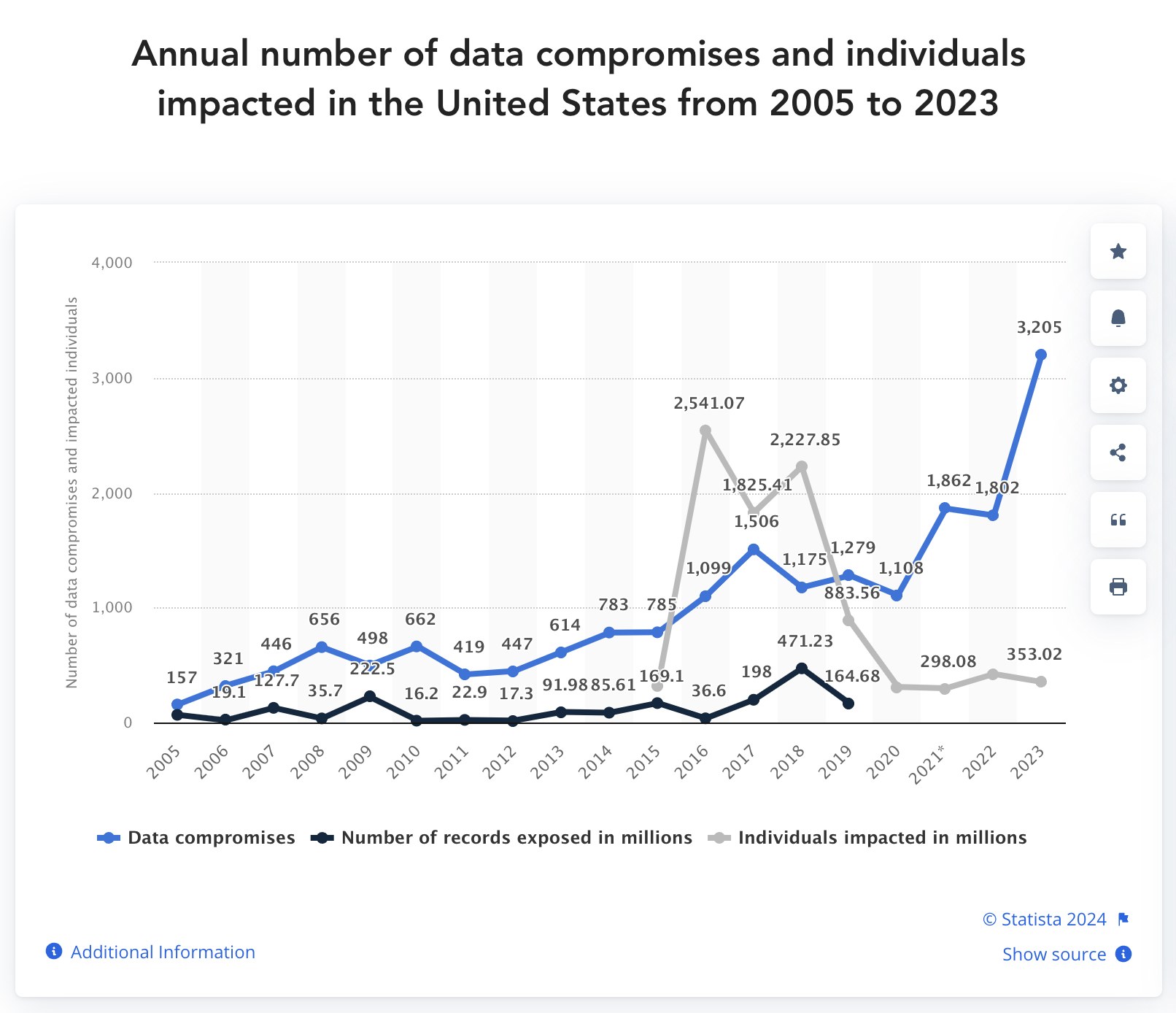
Data privacy is about more than just hiding search queries; it’s about maintaining autonomy in the digital realm, protecting freedom of expression, and securing personal and sensitive information against unauthorized access.
Alternative search engines play a crucial role in this context, offering tools that empower users to take control of their online presence.
7 Privacy-Focused Search Engines
Privacy-focused search engines distinguish themselves by not tracking users’ search history, IP addresses or click behavior:

Unlike their mainstream counterparts, which compile extensive profiles on users to target advertisements, these alternative platforms adopt a no-log policy.
This approach ensures that searches are not only anonymous but also uncoupled from any personal data, offering a level of privacy that is increasingly rare in the digital age.
Here’s a list of the top privacy-focused search engines:
DuckDuckGo
Known for its strict privacy policy, DuckDuckGo does not track searches or store personal information. It offers a clean, straightforward search experience with useful features like !bang shortcuts and instant answers.

Brave Search
Developed by the team behind the Brave Browser, Brave Search focuses on user privacy and does not track or profile its users. It’s an independent search engine that offers unbiased results without reliance on other search providers.

StartPage
By using Google’s search results but removing all trackers and logs, StartPage provides high-quality search results without compromising user privacy. It also features an anonymous view mode for webpages.

Swisscows
A search engine that prioritizes privacy and family-friendly content, Swisscows doesn’t store personal data or search queries. It uses semantic information recognition to provide intuitive search results and is based in Switzerland, known for its strong privacy laws.

Mojeek
Unlike most alternative search engines, Mojeek is a crawler-based search engine (like Google and Bing) that has its own index of web pages. It prides itself on being a no tracking, unbiased and independent search engine.

Searx
Searx is an open-source metasearch engine that aggregates results from more than 70 search services while ensuring privacy. It doesn’t track users or share search data. Users can even host their instance of Searx for additional privacy (hosting your instance of Searx means that you control the server and software, which offers several privacy and customization benefits).
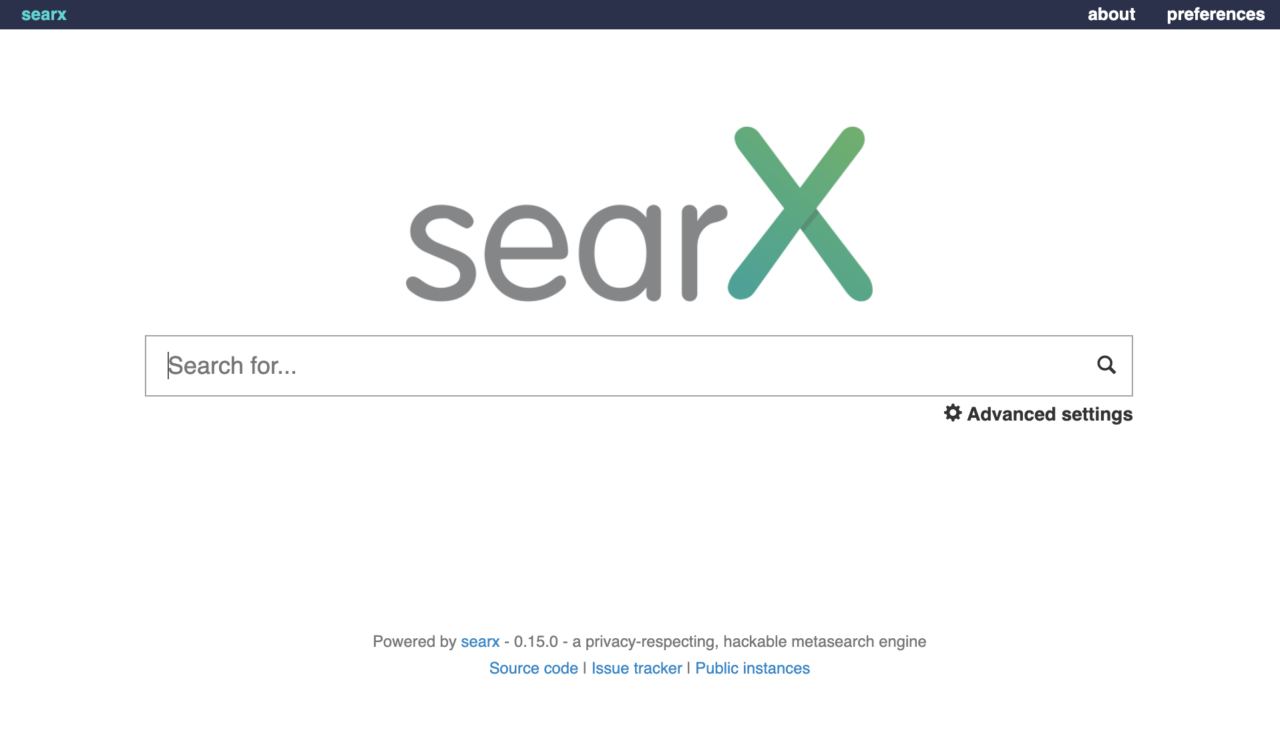
Qwant
Qwant is based in France, and is a privacy-preserving search engine that doesn’t track searches or profile users. It organizes search results into categories like web, news and social for easier navigation.
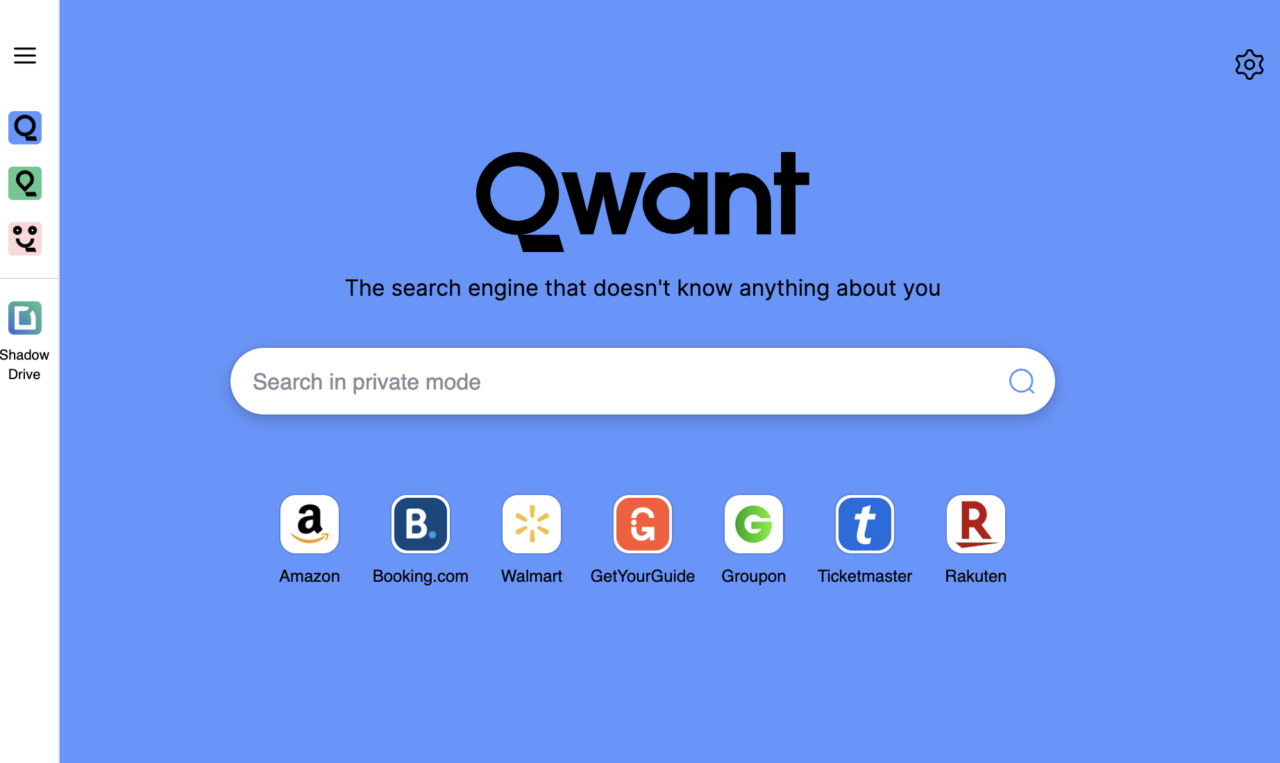
Each of these search engines offers unique features and privacy protections, catering to users who prioritize their online anonymity and want to avoid the data collection practices of mainstream search engines.
Robust Security Features
Beyond privacy, alternative search engines often incorporate advanced security features to protect users from malware, phishing and other online threats.
The advanced security features incorporated by alternative search engines are designed to provide a safer online search experience, protecting users from a wide range of cyber threats. These features often include, but are not limited to:
- HTTPS Encryption: HTTPS (with the “S” which stands for security) ensures that the connection between the user’s device and the search engine is encrypted, protecting search data from being intercepted by third parties.
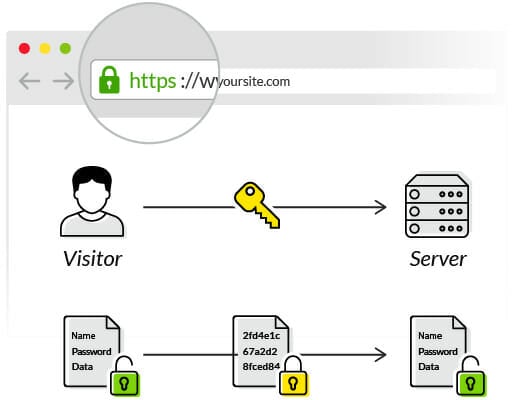
- Malware and Phishing Protection: Many privacy-focused search engines integrate with databases of known phishing sites and malware distributors, actively blocking or warning users about potentially harmful websites.
- Anonymous Searching: By anonymizing searches, these search engines prevent user search data from being linked to their online identities, reducing the risk of targeted attacks.
- Content Filtering: Offers options to filter out explicit content, making the search engine safer for all users, including children. This feature is particularly useful for educational institutions and parents.
- Secure Search Protocols: Some search engines use their own secure protocols or unique algorithms to ensure that search results are delivered without exposing the user to security risks.
- No Tracking or Logging: While not a direct security feature, the commitment to not track or log user activity contributes to overall security by minimizing the amount of data available to potential hackers.

- Ad-Free Experience or Safe Advertising: By offering an ad-free experience or vetting advertisements carefully, these search engines reduce the risk of malicious ads that could lead to compromised security.
- Customizable Privacy Settings: Allows users to customize their level of privacy and security, enabling features like automatic history clearing, cookie management, and more.
- Integration with Privacy Tools: Some search engines offer seamless integration with other privacy tools, such as virtual private networks (VPNs) and privacy-focused browsers, for an added layer of protection.

- Regular Security Audits: Conducting regular security audits and updates to ensure that the search engine’s infrastructure is protected against the latest online threats.
By filtering out harmful websites and employing secure search protocols, they provide a safer browsing experience. This security-first approach is particularly appealing to users who prioritize the integrity of their online activities and wish to shield themselves from the myriad of cyber threats.
Need help enhancing your organic reach with proven strategies? Single Grain’s search engine experts can help!👇
Optimize Search Diversification
Customized Search Experiences
Unlike mainstream search engines that often prioritize popular or sponsored content, alternative search engines offer a bespoke journey across the internet.
Let’s take a look at the unique customization features that set alternative search engines apart and provide users with tailored search results that align with their individual preferences and interests.
✅ Personalization Without Compromise. Users can often customize filters, such as date ranges, content types and sources, to narrow down search results to what’s most relevant to them. This level of customization ensures that users spend less time sifting through irrelevant information and more time engaging with content that matters.
✅ Niche Markets and Specialized Searches. Whether it’s academic research, industry-specific information or hobby-related content, these platforms offer search algorithms fine-tuned to deliver precise results. This specificity supports users in fields where mainstream search engines may not provide the depth or breadth of information needed.
✅ Search Beyond the Mainstream. One of the most compelling aspects of alternative search engines is their ability to uncover information beyond the mainstream web. By indexing websites and databases not typically prioritized by larger search engines, they offer a gateway to a broader spectrum of knowledge and viewpoints, enriching the user’s understanding of a subject.
✅ Promoting Content Diversity. By indexing a wider array of websites, including those that are not mainstream, alternative search engines make sure that users have access to a wider range of perspectives. This is particularly important for niche topics, minority viewpoints and specialized academic research that might not rank highly on mainstream search engines due to their algorithms’ commercial biases.
✅ Decentralizing the Web. By providing visibility to a variety of websites, alternative search engines help prevent the concentration of online power and information in the hands of a few major platforms. This decentralization supports the original vision of the web as an open, democratic space where information is freely accessible to all.
✅ Supporting Open Source and Non-Profit Projects. Many alternative search engines are open source or run by non-profit organizations. This means they’re often more transparent about their operations than their commercial counterparts. By using these search engines, users support a model of the internet that values community development, transparency and the free exchange of ideas over profit.
The capacity for customized search experiences is definitely a defining feature of alternative search engines, distinguishing them as not just tools for finding information but as partners in the exploration of the digital realm.
How Do Alternative Search Engines Affect Marketers?
The rise of alternative search engines presents both challenges and opportunities for marketers. In this section, we’ll take a look at these as well as offer some tips on how marketers can include alternative search in their strategies.
Diversification of SEO Strategies
Traditional search engine optimization has been heavily focused on Google, obviously, given its dominant market share.
Now with alternative search engines like Bing, DuckDuckGo and others becoming more and more popular, marketers need to adapt their SEO strategies to account for the different algorithms and user bases of these platforms. This means optimizing content for a broader range of search engines to reach a wider audience.
Tip: Conduct keyword research specific to each search engine to identify variations in search behavior. Use tools that offer insights into these other platforms, such as:
- Microsoft Bing Webmaster Tools: Similar to Google’s Search Console, Bing Webmaster Tools offers insights into how your site performs on Bing. It provides data on search traffic, keyword rankings, crawl errors and more, allowing marketers to optimize their site for Bing’s search engine.
- DuckDuckGo Traffic Estimation Tools: While DuckDuckGo does not offer an official tool for webmasters, traffic estimation tools like SimilarWeb or Alexa can provide insights into traffic trends and audience demographics for sites that perform well on DuckDuckGo. Additionally, focusing on privacy-friendly marketing practices can align with the preferences of DuckDuckGo’s user base.
- Keyword Tool: Keyword Tool uses autocomplete data from Google, Bing, YouTube and other platforms to generate keyword ideas. This can be particularly useful for understanding search trends and user queries on Bing and beyond.
- Microsoft Advertising Intelligence: Previously known as Bing Ads Intelligence, this is a free keyword planning tool that works within Excel to help marketers research and plan their Microsoft Ads campaigns with data on search volume, demographic information, and more.
Plus, of course, the usual suspects that work for Bing at least:
- Semrush: Semrush is a comprehensive SEO tool that offers keyword research, site audits, competitor analysis, and more. While it’s often associated with Google, it also provides data for Bing, giving marketers a way to compare performance and optimize across both search engines.
- Ahrefs: Ahrefs is another powerful SEO tool that offers keyword research, backlink analysis and site audits. It includes search volume data and keyword rankings for Bing, helping marketers understand their visibility on this platform.
- SpyFu: SpyFu is a tool focused on competitor analysis, keyword research and PPC insights. It provides data on both Google and Bing, allowing marketers to see where competitors are investing their efforts and how they can adjust their strategies for better performance across search engines.
Privacy-Focused Marketing
Privacy-focused search engines like DuckDuckGo means that marketers need to be mindful of privacy regulations (e.g., GDPR, CCPA) and adapt their strategies to be more privacy-centric, potentially moving away from reliance on personal data and towards context-based targeting and content marketing.
Tip: Emphasize consent-based marketing practices and transparent communication about data usage. Invest in first-party data collection methods, such as email subscriptions and customer feedback, to build direct relationships with your audience without compromising their privacy.
Read our post Understanding Google’s Third-Party Cookies Phase-Out Extension to learn more.

Niche Targeting Opportunities
Alternative search engines often cater to specific niches or values, such as privacy with DuckDuckGo or eco-consciousness with Ecosia. Marketers can leverage these platforms to target audiences more precisely based on specific interests or values, potentially leading to higher engagement and conversion rates for campaigns aimed at these niche groups.
Tip: Develop and promote content that resonates with the specific values and interests of the audience on each platform. For example, if targeting users on Ecosia, create content that highlights your brand’s sustainability efforts or eco-friendly products.

Increased Competition and Cost Considerations
With more platforms to consider, there’s an increase in the complexity of managing and optimizing campaigns across multiple search engines. This can lead to higher costs and resource allocation for businesses as they try to maintain visibility across a broader set of platforms. However, it also opens up new avenues for visibility if competitors are slower to adapt to these platforms.
Tip: Allocate marketing budgets across different platforms based on their potential ROI and your target audience’s distribution. Use A/B testing to find the most cost-effective strategies for each search engine and adjust your investment accordingly.
Analytics and Measurement
Tracking performance across multiple search engines can certainly be challenging, and requires that marketers adapt their analytics strategies to gather insights across diverse platforms. Understanding the performance and ROI of marketing efforts becomes more complex but also more critical.
Tip: Implement a comprehensive analytics platform that can integrate data from multiple search engines. One such tool is Looker Studio (formerly Google Data Studio). While it is a product of Google, it’s incredibly versatile and can be used to create custom dashboards that pull in data from a wide range of sources.
Here are the key features of Looker Studio:
- Custom Data Connectors: This tool supports custom connectors through its Community Connectors feature, allowing users to pull in data from various sources, including Bing Ads, Google Ads, Google Analytics and third-party platforms. While it may not have direct integration with every search engine like DuckDuckGo, data can often be imported through CSV files or third-party connectors developed by the community or other SaaS providers.
- Comprehensive Dashboarding: Users can create detailed, customizable dashboards and reports that visualize data across different dimensions, metrics and sources. This makes it possible to compare performance metrics like traffic, conversions and rankings across search engines, assuming you have access to the necessary data.
- Integration with Analytics and Advertising Platforms: Direct integration with Google’s suite of products (e.g., Analytics, Ads, Search Console) and the ability to integrate data from Bing through Microsoft Advertising and other platforms ensures a broad view of your online presence.
How to leverage Looker Studio for multiple search engines:
- Use Community Connectors: Explore the available community connectors for integrating data from platforms like Bing and others. If there’s no direct connector, consider using a third-party service that aggregates your SEO data and offers a Looker Studio connector.
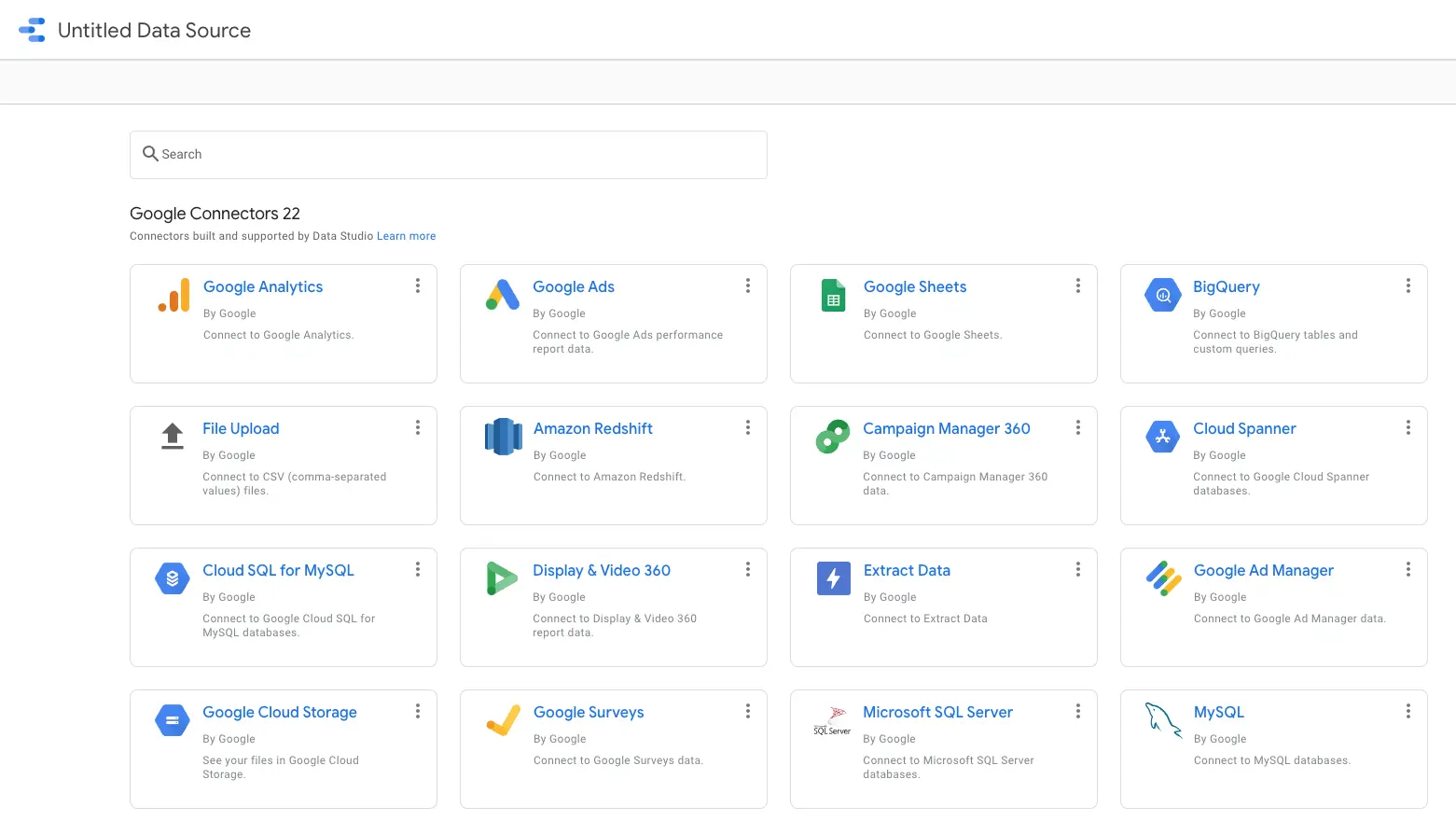
- Import Data Manually if Needed: For search engines that don’t offer direct integration or a community connector, you can often export data to CSV and then import it into Looker Studio using the Google Sheets connector.
- Customize Your Dashboards: Create custom dashboards that focus on the KPIs most relevant to your multi-search engine strategy. This might include organic traffic, keyword rankings, click-through rates, and conversion metrics across different platforms.
As alternative search engines innovate (e.g., using AI, focusing on sustainability, enhancing privacy), marketers need to stay abreast of these changes and explore new ways to engage audiences via their marketing strategies. Basically, the rise of alternative search engines encourages marketers to broaden their SEO and online marketing strategies.
Just want someone to do all the work for you? Single Grain’s search engine experts can help!👇
Optimize Search Diversification
BONUS: Social Platforms as Emerging Search Engines
It’s worth nothing that the alternative search engines mentioned above are not the only options.
Social media platforms are evolving into significant sources of information, offering a unique blend of real-time news, personal opinions and a wide array of content that traditional search engines may not capture as immediately or personally.
Although these are not viable options for privacy-centric searches, there are some key benefits to using social media platforms as search engines:
- Real-Time Updates: Social media platforms are excellent for getting real-time information. During events, crises or trending topics, users can find live updates, videos and discussions, which might not be as quickly available through traditional search engines.
- Personalized Content: Algorithms on social media platforms tailor content based on user interactions, preferences and network. This can lead to more relevant search results compared to the one-size-fits-all approach of traditional search engines.
- Diverse Perspectives: Social media allows for a wide range of voices and perspectives (technically, anyway). Users can explore content from different communities, cultures and viewpoints, offering a more rounded understanding of topics.
- Visual and Multimedia Content: Social media is rich in visual content, including images, videos and infographics, making it a go-to for users seeking visual information or learning through multimedia.
- User Engagement: The interactive nature of social media allows users to engage with content creators directly through comments, likes and shares. This engagement can provide additional insights and community opinions that enrich the search experience.
- Networking and Community Building: Searching on social media can lead to discovering groups and communities of interest. This is beneficial for users looking to connect with others who share similar interests or require support and advice.
Despite these benefits, it’s important to note that social media also has drawbacks as a search engine. The accuracy of information can vary greatly, and the platforms can propagate misinformation. You should always evaluate sources and cross-reference information for reliability and accuracy.
These popular platforms serve well as search engines, each with its unique strengths:
- Twitter: Known for its real-time updates, Twitter is excellent for searching the latest news, trending topics and public opinions. Its hashtag system makes it easy to follow specific topics or events, making it a go-to platform for immediate information and global trends.
- YouTube: As the world’s largest video-sharing platform and second-largest search engine, YouTube is an invaluable resource for tutorials, reviews, news and entertainment. Its search function allows users to find videos on virtually any subject, with content ranging from professional productions to user-generated videos.
- Reddit: Dubbed “the front page of the internet,” Reddit hosts communities (subreddits) on nearly every topic imaginable. Users can search within these communities for in-depth discussions, personal anecdotes, advice and a wide array of opinions. Its voting system helps surface the most valuable content as determined by the community.
- Instagram: Primarily a visual platform, Instagram is great for searching visual content, including photos and videos. Its hashtag and location tagging systems make it easy to discover content related to specific themes, places or events. It’s particularly popular for lifestyle, fashion, travel and food-related searches.
- LinkedIn: As a professional networking platform, LinkedIn serves as a valuable resource for searching for industry news, professional content, company information and job opportunities. Its search capabilities allow users to find and connect with professionals, join industry groups and engage with content relevant to their professional interests.
Two social networks that have been in the news lately are…
TikTok
TikTok, primarily known for its short-form video content, is aggressively making strides into the search engine domain. The platform is pushing for users to add a Search shortcut, which seems to go hand-in-hand with the testing of new engagement features between creators and paying subscribers.
These developments suggest that TikTok’s potential to become a go-to destination for discovering not just entertainment but also information, advice and tutorials, challenging traditional search engines in the process.
Here’s how TikTok excels as a search engine:
- Trend Discovery: TikTok is a hotspot for the latest trends, memes and challenges, making it an excellent platform for users wanting to stay up-to-date with popular culture and content.
- Personalized Recommendations: The platform’s algorithm excels at curating content tailored to the user’s interests, based on their interactions. This personalization makes the search experience highly engaging and relevant.
- Creative Inspiration: Users often turn to TikTok for creative ideas, inspiration, and how-to guides, thanks to the platform’s diverse community of content creators.
- Educational Content: Despite its reputation for entertainment, TikTok hosts a lot of educational content across various fields, including science, finance, cooking, and more.

Pinterest is another powerful tool for discovery, particularly known for its visual search capabilities and inspiration boards. It’s long been a source of inspiration for hobbies, fashion, home decor, DIY projects and more.
Its continued user growth and a major advertising partnership with Google highlight the platform’s increasing relevance as a search and discovery tool. Unlike traditional search engines that rely on text queries, Pinterest’s visual search capabilities allow users to discover ideas and products through images, tapping into the visual nature of human cognition.
Here’s why Pinterest is effective as a search engine:
- Idea and Inspiration Curation: Users can search for inspiration across a wide range of categories such as home decor, fashion, recipes, wedding planning, and more.
- Visual Search Technology: Pinterest’s visual search feature allows users to search for similar items or ideas based on images, making it a unique tool for finding visually related content.
- Planning and Organization: The platform enables users to organize ideas and inspirations into boards, making it ideal for project planning and organization.
- Shopping: Pinterest also integrates shopping features, allowing users to discover and purchase products directly through the platform, making it a go-to for style, home decor, and lifestyle product searches.

Conclusion: The Future of Web Search
The future of web search definitely has alternative search engines playing a pivotal role. These platforms are not merely tools for finding information; they are gateways to a more private, customized and diverse internet experience. By prioritizing user needs over data collection and advertisement targeting, alternative search engines are setting new standards for what it means to search the web.
The future of web search is likely to be characterized by increased competition and innovation, as alternative search engines continue to evolve and introduce new features. This competition not only benefits users, but also pushes the entire industry towards greater transparency, respect for privacy, and a commitment to delivering high-quality, relevant search results.
As more users discover and embrace these platforms, we can look forward to a web search landscape that is not only more diverse and secure but also more aligned with the needs and values of its users.
If you’re ready to overcome algorithmic complexities and boost your online visibility across search engines, Single Grain’s search engine experts can help!👇
Optimize Search Diversification
Alternative Search Engines FAQs
-
What is the best alternative search engine?
The “best” alternative search engine depends on what you’re looking for in terms of privacy, user experience, and search capabilities.
- DuckDuckGo is widely recognized for its privacy-focused approach, as it does not track user searches or behavior.
- Bing offers a robust search engine with similar functionalities to Google, including image, video and news search, and is integrated with Microsoft’s products.
- Ecosia is known for its environmental impact, as it uses profits to plant trees. Each of these has its own unique features and benefits, making the best choice subjective to user preferences.
-
Is there a better alternative to Google?
Whether an alternative is “better” than Google depends on the criteria used for comparison. Google’s strength lies in its powerful search algorithms and extensive dataset, but alternatives may offer benefits in areas like privacy, ethics or specific functionalities.
For users prioritizing privacy, DuckDuckGo might be considered better due to its non-tracking policy.
For those looking for a search engine that supports environmental causes, Ecosia might be seen as a superior option.
-
Is there a search engine that doesn't use Google?
Yes, there are several search engines that operate independently of Google’s search algorithms and databases, including:
- DuckDuckGo uses a combination of its own web crawler, called DuckDuckBot, and data from over 400 other sources, but not directly from Google.
- Bing, developed by Microsoft, is another major search engine with its own search technology.
- Yandex and Baidu are examples of search engines that are dominant in Russia and China, respectively, and operate independently of Google.
-
What is the best unfiltered search engine?
The term “unfiltered” can be interpreted in different ways, but if it refers to search engines that provide results with minimal personalization or censorship, then DuckDuckGo is often cited for its privacy-focused approach and minimal filtering based on user data.
For users seeking minimal content moderation policies, options might include Yandex or Baidu, though their level of filtering can vary and is subject to local regulations.
However, it’s important to note that no search engine is completely unfiltered, as they all have algorithms designed to combat spam and illegal content.



